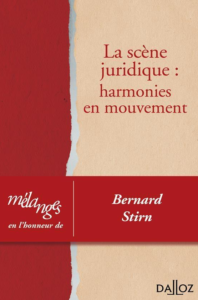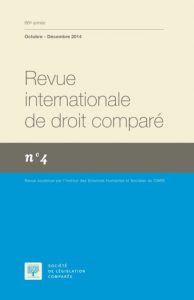Déc 9, 2019
 Book description:
Book description:
The French projet d'ordonnance, which reformed contract law, the general regime of obligations and the proof of obligations appeared in February 2015. One year later, in February 2016, the final version of the ordonnance was published. The ordonnance thoroughly reforms French contract law and the law of obligations and will enter into force in October 2016.
This book results from the Contract Law Workshop of the 20th Ius Commune Conference held 26-27 November 2015. The theme of this Workshop was: 'The French Contract Law Reform: a Source of Inspiration?' Since the conference in November 2015, all authors have incorporated comments on the final version of the ordonnance.
Whereas Van Loock briefly sketches the antecedents and the outcome of the reform, the other authors each tackle specific topics of the reform that surprised and/or excited the legal community. Pannebakker tackles the precontractual phase and assesses the attractiveness of the reform for international commercial transactions. Peeraer gives a critical overview of the doctrine of nullity in the ordonnance. Leone explores the potential impact of the 'significant imbalance' test in the new ordonnance on employment contracts. In their contributions, Lutzi and Oosterhuis discuss the much-debated provision that introduces the theory of imprévision. The contributions by Jansen and Verkempinck are both focused on remedies: the newly introduced price reduction remedy and damages. Storme criticises the new rules on set-off in the ordonnance, and Mahé addresses the question why the final version of the ordonnance omitted the issue of interpersonal effects of fundamental rights on contractual freedom.
Contributions:
- Sander Van Loock - The Reform of the French Law of Obligations: How Long will the Belgians Remain Napoleon's Most Loyal Subjects?
- Ekaterina Pannebakker - Pre-Contractual Phase: Reflections on the Attractiveness of the New French Rules for the Parties to International Commercial Transactions
- Frederik Peeraer - Nullity in the Ordonnance
- Candida Leone - A Tale of Novelty and Continuity: Exploring the Future Judicial Control of Employment Contracts in the French Contract Law Reform
- Tobias Lutzi - Introducing Imprévision into French Contract Law - A Paradigm Shift in Comparative Perspective
- Janwillem (Pim) Oosterhuis - Commercial Impracticability and the Missed Opportunity of the French Contract Law Reform: Doctrinal, Historical and Law and Economics Argument - Comment on Lutzi's Introducing Imprévision into French Contract Law
- Sanne Jansen - Price Reduction unter the French Contract Law Reform
- Brecht Verkempinck - The Measure of Damages in the French Contract Law Reform - Lessons from far more Inspiring Systems
- Matthias E. Storme - Set-off in the French Reform of the Law of Obligations: a Tale of Missed Opportunities?
- Chantal Mahé - Fundamental Rights in the French Contract Law Reform
Déc 6, 2019
Données bibliographiques / Bibliografische Daten |
|---|
| Auteurs / Autoren: | PAULUS, ANDREAS |
|---|
| Source / Fundstelle: | in: La scène juridique: harmonies en mouvement (en l'honneur de Bernard Stirn), Dalloz, p. 475 - 482. |
|---|
| Année / Jahr: | 2019 |
|---|
| Catégorie / Kategorie: | Droit constitutionnel |
|---|
| Mots clef / Schlagworte: | ETAT DE DROIT, LEGALITE, SECURITE JURIDIQUE |
|---|
 Résumé:
Résumé:
L'auteur présente les deux concepts de légalité et sécurité juridique en tant que principes étroitement liés l'un à l'autre et les deux à la notion d'État de droit. Il donne un aperçu plus compréhensible de ces deux notions en les expliquant par la suite à travers trois exemples concrets de la jurisprudence.
Plan de la contribution:
I. Introduction: La légalité et la sécurité juridique
II. La sécurité juridique en tant que principe dérivé, et ses sous-principes
III. Exemples récents de la jurisprudence
A. Les principes de clarté et de prévisibilité des contributions financières
B. La rétroactivité pour la clarification rétroactive d'une loi
C. La sortie de l'énergie nucléaire
IV. Sommaire
Nov 6, 2019
Données bibliographiques / Bibliografische Daten |
|---|
| Auteurs / Autoren: | FISCHER-ACHOURA, EVA |
|---|
| Source / Fundstelle: | Revue internationale de droit comparé, n° 3, p. 625-644 |
|---|
| Revue / Zeitschrift: | Revue internationale de droit comparé |
|---|
| Année / Jahr: | 2019 |
|---|
| Catégorie / Kategorie: | Droit civil |
|---|
| Mots clef / Schlagworte: | Contrat, IMPREVISION |
|---|
 Résumé de l'auteur:
Résumé de l'auteur:
La force de la consécration de la théorie de l'imprévision peut se mesurer tant dans les conditions de sa mise en œuvre que dans les effets qui lui donnent le droit allemand et le droit privé français. Quelle est l'intensité requise du changement imprévu? Un changement affectant la base subjective du contrat, l'utilité de l'existence même du contrat pour l'une des parties, est-il admis? L'imprévu peut-il résulter d'une erreur des parties dès la formation du contrat? À défaut de consensu sur l'adaptation du contrat, la résolution unilatérale est-elle permise? Quelle est la liberté du juge sollicité afin d'adapter le contrat? La partie lésée par l'imprévu, a-t-elle un véritable droit subjectif d'être déliée du contrat tel qu'il était initialement conçu? Les solutions consistant en la révision ou la rupture du contrat, sont-elles hiérarchisées? La question de la vigueur du dispositif nouvellement consacré en droit privé français, ne peut pas recevoir une réponse exhaustive et précise avant l'intervention de la jurisprudence. À cet égard, le droit allemand de l'imprévision, inspiré et dévelope par la jurisprudence depuis un siècle, permet de saisir le potentiel de la législation française.
Plan de l'article:
I. Conditions de mise en œuvre de la théorie de l'imprévision
A. Exigence d'une prévoyance lors de la conclusion du contrat
B. Le changement de circonstances rendant l'exécution du contrat plus contraignante
C. Une conception plus large de l'imprévu permettant de mettre en œuvre la théorie d el'imprévision?
II. Modalités de mise en œuvre de la théorie de l'imprévision
A. L'étape extrajudiciaire: renégociation ou résolution du contrat, à la disposition de la partie lésée
B. Une étape spécialement prévue par le droit français: le d´lai de carence avant saisine unilatérale du juge
C. L'étape judiciaire: révision ou résolution du contrat, quelle liberté pour le juge?
Nov 5, 2019
Données bibliographiques / Bibliografische Daten |
|---|
| Auteurs / Autoren: | GUINERET-BROBBEL DORSMAN, ANNE |
|---|
| Source / Fundstelle: | Revue internationale de droit comparé, n° 3, p. 607-624 |
|---|
| Revue / Zeitschrift: | Revue internationale de droit comparé |
|---|
| Année / Jahr: | 2019 |
|---|
| Catégorie / Kategorie: | Droit civil |
|---|
| Mots clef / Schlagworte: | Contrat, silence |
|---|
 Résumé de l'auteur:
Résumé de l'auteur:
En droit français comme en droit allemand, le contrat ne peut pas naître en principe du silence. Qui ne dit mot ne consent pas. Ce principe connaît bien évidemment des exceptions tant en Allemagne qu'en France. L'une de ces exceptions, propre au droit commercial allemand, est connue sous l'expression Lehre vom kaufmännischen Bestätigungsschreiben, "théorie de la lettre de confirmation".
Si aucun écrit n'est rédigé lors de la conclusion d'un contrat, il est une habitude répandue en Allemagne consistant en l'envoi d'une lettre de confirmation fixant ce qui a été convenu entre les négociateurs. Le destinataire de ladite lettre est censé la dénoncer sans retard s'il désapprouve ses termes. En l'absence d'une telle opposition, le silence vaudra acceptation. Jurisprudence et doctrine allemandes ont forgé au fil du temps une théorie pleine de nuances et de subtilités.
Plan de l'article:
I. La théorie de la lettre de confirmation : notion et fondements
II. La théorie de la lettre de confirmation : conditions d'application
A. Conditions tenant à la personne de l'expéditeur et à celle du destinataire
B. Négociations préalables
C. Termes de la lettre
D. Date d'envoi et de réception de la lettre
E. Un auteur "digne de protection" (schutzwürdig)
F. Absence d'opposition ou opposition tardive du destinataire de la lettre
Conclusion
Oct 30, 2019
Données bibliographiques / Bibliografische Daten |
|---|
| Auteurs / Autoren: | WALDHOFF, CHRISTIAN; WITTMER, FABIUS |
|---|
| Source / Fundstelle: | https://www.cambridge.org/core/journals/german-law-journal/article/religious-education-in-germany-in-light-of-religious-diversity-constitutional-requirements-for-religious-education/DA53CF0E68B465C7FD4E027BAD3887AF# |
|---|
| Revue / Zeitschrift: | German Law Journal |
|---|
| Année / Jahr: | 2019 |
|---|
| Localisation / Standort: | German Law Journal, Volume 20, Issue 7, pp. 1047-1065 |
|---|
| Catégorie / Kategorie: | Droit de la religion, Religionsrecht |
|---|
| Mots clef / Schlagworte: | Religionsrecht, Religionsverfassungsrecht, Éducation religieuse, Enseignement de la religion |
|---|
 Abstract:
Abstract:
In Article 7, paragraph 3, the German Constitution provides that religious education shall be a part of the curriculum of public school. This is one of the three approaches of dealing with religious education existing today. Originally, religious education as a regular subject at public schools in Germany was only offered by the two Christian Churches—Catholic and Protestant. As the number of Christians decreased and the number of Muslims increased, the demand for Islamic religious education at public schools grew. Therefore, the question arose whether the constitutional law concerning religion is capable of facing the new challenges of religious diversity. This article tries to answer this question with regard to the introduction of Islamic religious education as a measure of adaptiveness. In the first step, the requirements of Article 7, paragraph 3 of the Constitution posed to religious education will be outlined in order to be able to examine in the second step whether Islamic religious education may be introduced at public schools as a regular subject. In this regard, the issue of the qualification of an umbrella association as a religious society and the constitutionality of the advisory board model will be discussed.

 Book description:
Book description:




